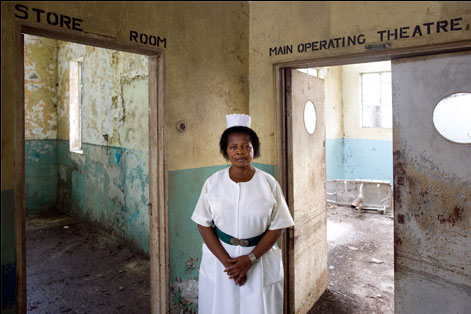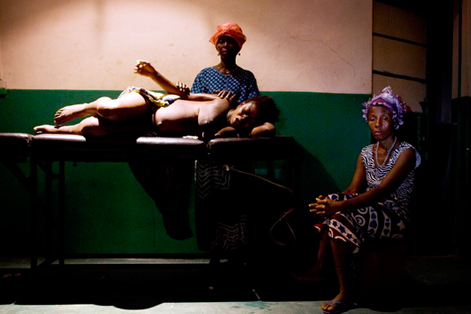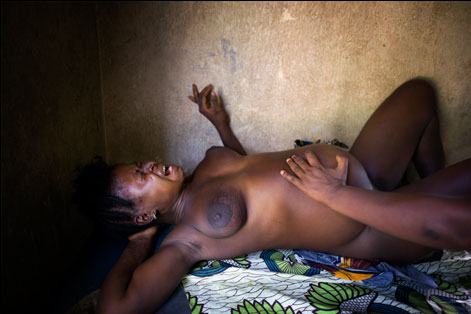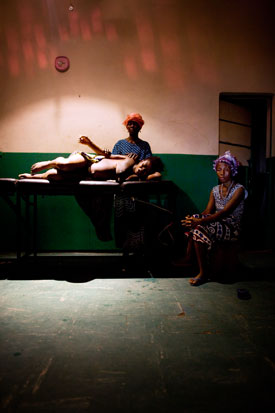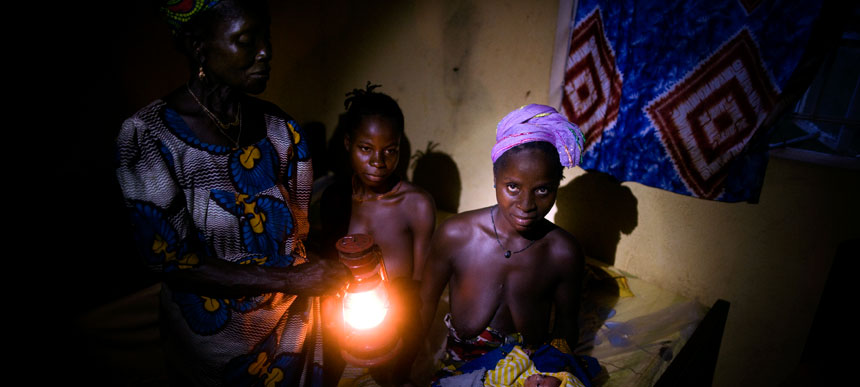
PHOTOGRAPHIE Toby Binder
The dying of mothers
The most dangerous thing you can do in Sierra Leone is get pregnant.
We followed a young woman as she gave birth.
Her fingernails scrape across the blackened, greasy wall, marked by the hands of countless women before her. They dig into the plaster, scraping out some fine grit and scratching a bright trail down the wall. The arm falls weakly onto an emaciated body creased up in pain. Fatmata Kammal, 20, is writhing in agony on a bed frame, her legs trembling. She's in her 41st week of pregnancy. She rolls her head back and struggles to speak. "God, come closer," she pants. "Dear dear dear God." Her contractions started two days ago and she has been bleeding for two weeks. Fatmata's baby is long overdue. The floor under the bed is covered in urine, vomit and bloodstained swabs. "Push!" shout the old women, her midwives, who are growing increasingly nervous as they watch over the pregnant young woman. There are three of them gathered in this dark chamber, a place where life and death meet. "Push!" shout the old women. Through the window, Fatmata's screams can be heard in the village square outside where they mingle with the shrieks of children playing. It's a Monday in early March, just after two in the afternoon. Half an hour before, a nineteen-strong procession comprising the mother, aunts, husband and midwives brought Fatmata to the government-run health centre at Bandajuma in the Kailahun province, eastern Sierra Leone. It's a brick building with old health promotion posters hanging off the walls and a vegetable patch where the nurses grow their own food. The family set out from the neighbouring settlement of Yendema, some six kilometres away, in the late morning. "We have to get to Bandajuma to Sister Hawa," the women insisted. "Only God and Hawa can help us now." The dying of mothers is one of the greatest disasters of our age – few others have claimed so many lives. It never makes the headlines, but leaves millions of bereaved husbands and motherless children. According to the World Health Organisation, 536,000 pregnant women die every year. More than half of these deaths occur in Africa. While Germany recorded 682,514 births in 2008 with a total of 36 maternal fatalities, health organisations report that the West African country of Sierra Leone has almost the highest maternal mortality rate in the world. One in eight women in Sierra Leone does not survive childbirth. Women die from infections or bleed to death because no-one remembers the afterbirth, which gets left inside them. Their own baby kills them, and dies too, because the mother doesn't get a caesarean. Or their internal organs fail. Or ignorant midwives induce labour using the wrong medication at the wrong time. Or the nearest hospital is simply too far away. Here in Sierra Leone there is nothing more potentially deadly to a woman than carrying a child inside her.
Behind the mighty cola tree that towers above her village, Fatmata's legs give way as she sets out on the path into the woods. "You're not going to give birth here in the jungle?!" cry the old women, as the pregnant woman falls to her knees with exhaustion. Fatmata herself came into the world on a reed mat. For one and a half years she has lived with Fomba Kamor, a farmer, who built a small mud hut for them at the edge of the village. The 29-year-old mutely follows the procession of women. He is a hard and determined worker, perhaps more so than any other in the village, who wants to get the most out of his fields. Fomba and Fatmata grow cassava plants, rice and palm fruits. This is the second marriage, and second child, for both of them. It seems their relationship hasn't been going too well lately – Fomba and Fatmata have been arguing a lot. She is jealous, while he calls her lazy when she works in the fields. After the birth, he hopes, life will be a little more peaceful. Everything will get better. The track leads through three swamps of squelching mud, with every footstep squeezing out the water. There is a rotten, mouldy smell along this path, often no wider than two pairs of sandals. Ants bite their legs raw and roots trip them up. It takes them two hours to reach the river, five metres wide, where a single palm tree provides the only means of crossing. Each person has to balance unassisted on the trunk as they make their way over the brown water. "It's not far now," say the old women. Fatmata crouches down on the bank and refuses to go on. She flails her arms when they try to take her hand. Floored by a wave of contractions. She struggles to her feet, cautiously steps onto the palm tree, and finally reaches Sister Hawa's door. Most of the time she's not in, but Fatmata is in luck – Hawa is there. But even she doesn't know what to do. The child is long overdue. It is too big and Fatmata's hips too narrow, Sister Hawa can see. Due to malnutrition in childhood. Her contractions can't push the baby through this eye of a needle. Hawa gently presses the stethoscope against the pregnant woman's skin. The two women's eyes meet above Fatmata's bump. Just audible beneath the mother's raging pulse, Hawa can hear the baby's heart quietly beating. "It's still alive," she says. The 29-year-old serves some 15,000 people in twelve villages. These health centres form a network across the whole of Sierra Leone. The health ministry says that all women in the vicinity are required to give birth in the health centres, but they are mostly far away from the villages. In reality, women only come to Hawa in an emergency. She completed a few months' training where she was taught a few basics about medicine. The health ministry promised her fifty dollars a month, but she rarely gets paid. Hawa pulls on her only pair of rubber gloves. "I want to feel where the baby's head is," she says, and reaches inside Fatmata. The old women had just been using the gloves to wipe up vomit, and Hawa usually washes them with soap before handling her patients. But this time she forgets. "It's still a very long way in," says Hawa, and walks out of the room. The village midwives make a lot of mistakes, and they work with only a stethoscope and their bare hands. But they are the only ones who care.
"Mamie," whimpers Fatmata and grabs hold of a midwife, pulling her to her bedside by her shirt. "Help me!" "There's nothing more I can do," says Mamie Momoh, 50, stone-faced and glassy-eyed, who has helped her throughout her pregnancy. "You have to do it by yourself, you and God." Momoh also hasn't slept for two days, hasn't eaten today. She is a member of the occupational group that is often held chiefly responsible for the dying of mothers in Africa. These midwives have rarely been to school – their knowledge is handed down over the generations. They make lots of mistakes, and work with just a stethoscope and their bare hands, but they are only ones who care. Even now. Most of the time there's no sign of nurse Hawa. She basically doesn't like her job, it nauseates her – and she tells everyone. But it is one of the few jobs that women in Sierra Leone can train for in school. Hawa is lying down in front of the building, legs outstretched, watching the sun sink below the horizon. Night falls on a country that stopped existing years ago. Sierra Leone was practically wiped out after a civil war that claimed as many as 200,000 lives. A state reduced to rubble. Between 1991 and 2001, the West African flagship nation was crushed by armies of child soldiers. High on drugs, they hacked people's hands and arms off, cut their lips off their faces. Fatmata's family escaped to Liberia, while her husband Fomba went to Guinea. When they returned there was nothing but a wide open clearing in the woods where their village used to be. In eight years they rebuilt their home, without any assistance. Today Sierra Leone is one of the world's poorest countries. 70 percent of people there live on less than a dollar a day. In this country, where there was brick, now there is mud. Naked, Fatmata raises herself up, her hands clenched into fists. Her head droops between her shoulders. A shiver runs through her as she slowly lifts her upper body, clearly suffering. The midwives silently cradle her head in their hands. Other women join them, place a plastic pot of blessed sweets on the top of her head, touch her. Fatmata shuts her eyes. They pray. The communion of women. These are extremely old prayers in a language whose meaning is lost to them. Then Fatmata keels over. The midwives resume their positions crouched by the bedside, wringing their gnarled fingers. The family buys kerosene for the lamp they want to light in the room. There's no other light in here. "What kind of child would cause me so much pain?" whispers Fatmata and kicks her legs against the wall. "You should do penance!" advises Mamie Momoh. God is punishing the expectant mother for her wild temperament, she believes. "Ask your husband for forgiveness," Momoh urges. "You've humiliated him, you insulted him so often." Outside, by the window, Fomba falls to his knees and prays for his wife's redemption. |
||||
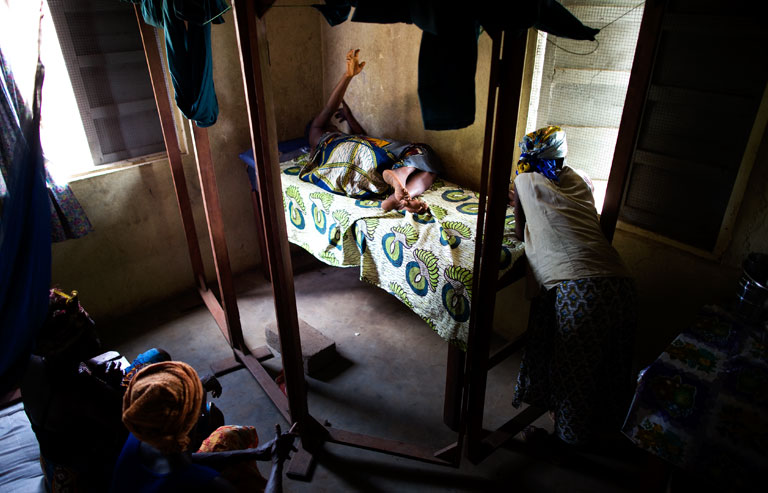 |
||||
Marianna Kamara, Fatmata's mother, who sat next to her during the trip, holds Fatmata's motionless body in her arms. "Don't do this to us Fati! Don't leave us alone!" she screams. Outside the hospital's maternity wing she throws herself to the ground, beating her fists into the dust. "My jewel! My little girl!" An older sister is frantically running up and down, her eyes wide with shock. "Fati is dead!" scream aunts, nieces, sisters. They tear at their hair. "Fati is dead!" They shout into the night that they want to die. Her husband Fomba lays Fatmata down on the floor. She's still breathing. But the Nixon Memorial Hospital, which is supposed to be her salvation, offers hope only in small doses. Built by the British in the 1930s, and later expanded, the Nixon used to be the most modern hospital in the eastern half of the country. The war years turned the building into a ruin, the site became overgrown with grass, and snakes nested in what used to be the operating wing. Now at the Nixon they operate in the former staff canteen. Surgical implements are sterilised in boiling water. There is one doctor and one midwife, but she can't see Fatmata. "I'm tired," she says abruptly, when they get through to her on the telephone. "I've been working all day and haven't eaten a thing. I can't come." The skies open up and the rain bursts forth, streams cascading off the hospital's roof. Lightning briefly illuminates the dark interior. Fatmata is lying on the stretcher that has finally arrived. The male nurse on duty stands beside her and asks the family to make a "personal gesture" first before he can attend to the emergency. He wants a bribe. The trainee nurses listlessly set about their work. It's their first year of training, and there are ten of them on the maternity ward. They don't run, they walk. In their blue uniforms. Fatmata has developed a condition known as eclampsia: skyrocketing blood pressure accompanied by seizures. In Sierra Leone this complication is often fatal. Her brain is being starved of oxygen. So is the baby's. She urgently needs a magnesium sulphate injection to relax her muscles, and a caesarean section. Instead she is placed on a platform bed in the delivery room and is given… nothing. The mortality rate at the Nixon Memorial Hospital is high. Twelve out of 125 female patients died here in 2009. The chances of survival are lowest for women who arrive during the night shift. The male nurse hands Fatmata over to the student nurses. He flirts with them, fills out some forms, then goes off to bed. He only took one brief look at the girl who is lying there in a critical condition. "I can't stand the sight of you any more!" one of the students screams at Fatmata's mother and her midwife, and throws them out of the delivery room. Now there is no-one left to pay any attention to the pregnant woman. The room resonates to the students' jokes, laughter and giggling – and the girl's screaming. "You shouldn't scream like that," one of the trainee nurses says, tapping on Fatmata's naked skin with her fingertip, "or you'll be ugly, ugly, ugly." A little while later blood starts to pour out of Fatmata's mouth. "You shouldn't scream like that," says one of the trainee nurses to Fatmata. "Or you'll be ugly, ugly, ugly." Thick sinews are standing out on her neck, her head is tilted backwards, her legs are outstretched to the point that her knees crack. Another fit, at 9 p.m. The ten students stop fooling around, and someone goes to wake up the nurse. "Quick," he says. Fatmata has bitten her tongue during the seizure, and is now in danger of suffocating on the blood. "Quick," he says again. Every breath gurgles in her windpipe. The student nurses hold her twitching legs down on the platform bed. At last he fills a syringe with magnesium sulphate, and sends a student to the lab to fetch a tablespoon. He sticks the needle into Fatmata's rigid hip and gets the trainee nurse to force her mouth open using the spoon handle wrapped in cotton wool. She can't do it by herself. Others join in, hold her head, three, four of them. They finally succeed, and the gurgling noise dies down until it stops. The family gathers in silence at the glass door to the delivery room. It's painted white, but the paint is cracked. They stare into the room, standing up, squatting down, lying on their stomachs. Fatmata's mother presses her face against the glass, places her hands on it. Marianna Kamara is already a kind of veteran among these women. At 40 years old she has survived six births, although having Fatmata nearly killed her. "Two whole days," she says. "Such pain." But many others around her have died, she says: neighbours, women she knew from working in the fields, and recently a cousin. Over successive generations, the dying of mothers is knocking a bigger hole in Sierra Leone's female population than the war did to its men. "But not Fati," says her mother to the glass door. "Not her."
The convulsions subside, releasing their grip on Fatmata's body. She is semi-conscious. She thinks she's at home, in her hut in the village. Her waters break shortly before midnight. The male nurse pulls on the rubber gloves, and listens with his stethoscope. The baby is alive, but still deep inside its mother. Who is becoming more and more exhausted. Her contractions are getting weaker. Time and again over the next few hours, she doubles up in pain on her platform bed. She stopped screaming long ago – now she only whimpers. Much of the time she lies there motionless like a sacrificial lamb on the altar. "Perhaps," the male nurse says at 2.40 a.m., "it's already too late for the baby." He bends over Fatmata and speaks into her ear. "Make an effort. Otherwise you'll get a caesarean, and that will cost your family a fortune." The proceeds of an entire year's harvest. In the Nixon Memorial Hospital, every single thing has to be paid for in cash. This is why there are so many unoccupied beds and the staff sit around bored – while outside people go without treatment and are unable to cure even the simplest illness. It's like this everywhere in Sierra Leone. There are hospitals, but hardly anybody ever goes to them. Patients who are admitted in an emergency are kept in the hospital until their families pay to release them. A woman with a baby has been living in the Nixon's maternity ward for more than three months because she owes the hospital 80 euros for a caesarean operation. Her husband, a diamond digger, last visited her weeks ago. She lives on the trainee nurses' leftovers. The fighting in Sierra Leone finished many years ago. The aid organisations are pulling out. Many have already left the country. The only hospital offering free treatment, which is operated by Médicins Sans Frontières, will soon be left to its own devices. Greetje Torbeyus, who is probably the only gynaecologist in the whole of Sierra Leone, regrets the withdrawal: In the hospital, every single thing has to be paid for in cash. This is why there are so many unoccupied beds. There are hospitals in Sierra Leone, but hardly anybody uses them. "The women here are in a much worse condition than in, say, the Congo. The complications are more serious. Women come here when they've almost bled to death." Not far from the Nixon Memorial Hospital, a coffin stands by the altar in the Methodist church. The mourners are wearing white. It's the day before Fatmata will fight for her life in the delivery room. "You will be in her place very soon," says the minister, pointing at the coffin. Inside is the wife of a senior government official. She died at the age of 37 in the capital city, Freetown, during her fourth pregnancy. Her husband has brought her body back to her home. He clings onto the coffin just like his youngest daughter clings onto him. She has just turned six. She doesn't move from his side. "I don't know how I can go on now," he says through his tears, and beats his hand on the lid of the coffin. "She loved me." Friends pull him away from the coffin, while the minister gives a loose rendition of psalm 90:5: "You sweep them away like a dream in the night." Man's mortality. It is the only comfort that remains to them in this church. Life bursts forth from Fatmata. One last effort pushes the head out, a final scream and the shoulders squeeze through. The nurse gently cradles the baby in his arms. The clock in the delivery room says 3.47 a.m. It's a girl.
SIERRA LEONE
ECONOMY
CIVIL WAR
THE DYING OF MOTHERS
36 ONE IN EIGHT |
|
|||
 |
 |
 |
 |
 |
 |
 |
 |
 |
 |
 |
 |
 |
 |
 |
 |
 |
 |
 |
||||||||

PHOTOGRAPHIE |
